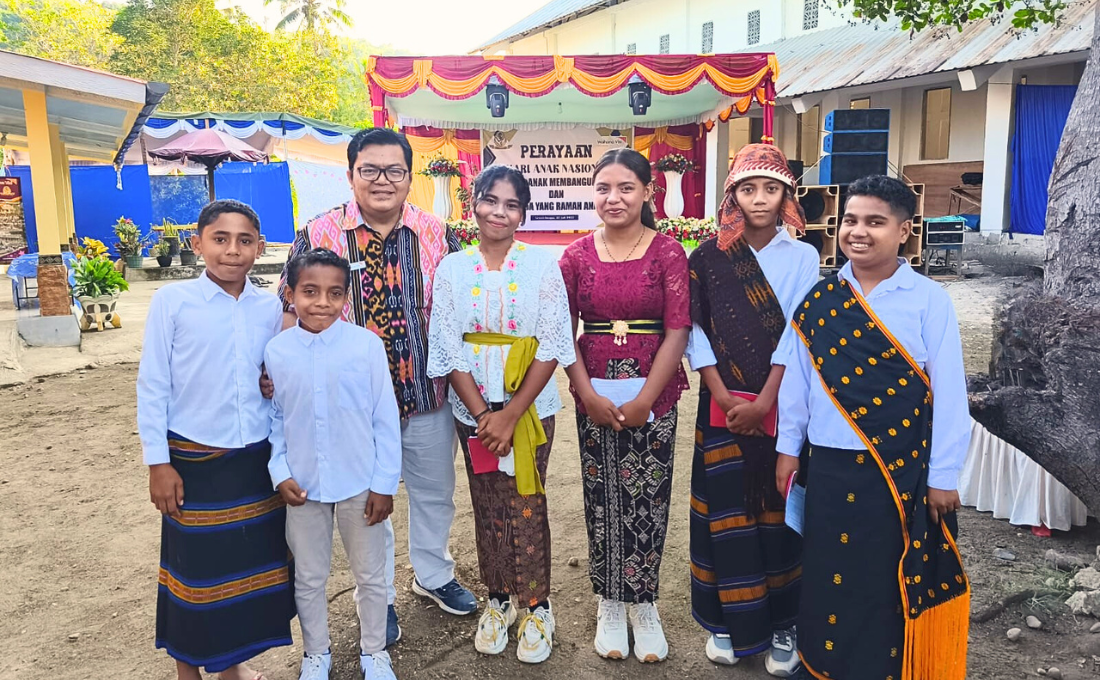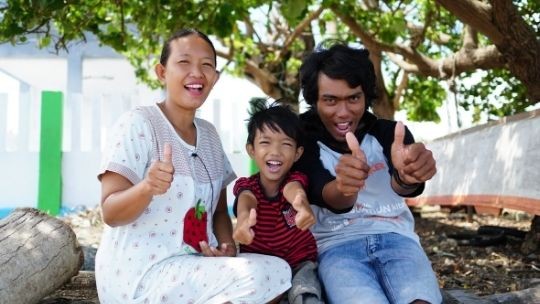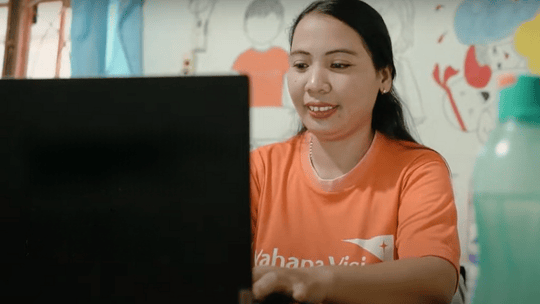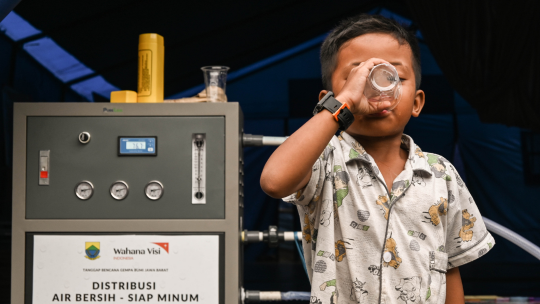Father Figure for the Family and Staffs

Working at Wahana Visi Indonesia (WVI) is not just about making an impact on children and communities; it's also about influencing your family—in the truest sense—and your colleagues, who come to feel like family. The significant impact will appear if rooted to WVI’s values that are lived out every day, regardless of your role, whether you're in the office or at home. Therefore, it is crucial for WVI to find humanitarian workers who voluntarily transfer these values to other people.
To ensure a smooth value-transfer, what is shared with the children and communities they work with must also be a part of their daily lives. Being a humanitarian worker at WVI means being ready to be an agent of change within your family and an example in your community. This can only happen when an organisation's values align with personal values. This alignment also ensures a higher quality implementation of community development programmes while maintaining staff motivation and commitment.
This unity of values is a journey and an experience lived by Portunatas, a staff member who has worked at WVI for almost 25 years. His personal values have aligned and even grown with WVI. For Portunatas, WVI has become a home and a church. As a home, it's a place where members support, rebuke, pray for, serve, and grow together. As a church, WVI is a tangible representation of service filled with love.
“The culture and habits in a home show how its members are seen by outsiders. Unity of heart within the home allows its members to show their distinct identity to the outside world. Both a home and a church have rules, but what is most important are the values and relationships that must be nurtured,” he says.
Portunatas currently serves as the Zonal Programme Manager for all of WVI’s operational offices in the East Nusa Tenggara area. He began his career with WVI as a programme coordinator at the Banggai operational office in Central Sulawesi in 2001. His long journey with WVI has led him to become a leader who applies and enriches the organisation's values.
A Caring and Loving Father at Home
As a child-focused organisation, WVI actively promotes the importance of fulfilling children's rights, including protection through positive parenting. The best advocates for this issue are staff members who are also parents, like Portunatas. Before becoming a father, Portunatas was a humanitarian worker who delivered materials on children's rights to communities in the villages he worked with. When he became a father, he applied the insights he shared with the community to his own family.
The father of three feels that the most memorable transformation he has experienced during his time at WVI is a revolution in his family relationships. "Especially in how I educate and dialogue with my children. The way my parents used to raise me, with 'forced' discipline, has changed into discipline that is dialogued and agreed upon with my children. I used to think I'd follow my father's very strict way, where everything 'must' be done. You 'must' be top of the class, 'must' prepare fodder for the livestock, 'must' be at your study desk at a certain time without daring to object. All of that was transformed by my understanding of educational systems, communication principles, children's rights, and many other topics I learned at WVI," he shared.
In the eyes of his children, Portunatas is a father but feels like a friend. Now that his three children are teenagers, being a father who is also a friend to talk to is very rewarding. Not all children experience such a warm and close relationship with their parents. But because Portunatas internalised the organisation's values, he and his wife parent in a way that respects each child's rights.
"When they message me now, it's no longer just to ask for pocket money; we ask how each other is doing. 'What are you up to, Dad? Are you busy? I want to tell you something.' It's like that. My eldest child once told me her friends were jealous of her because she could have such a fluid and close relationship with her father. They couldn't do that with their own dads," says the man, who is affectionately known as Pak Portun.
By applying what WVI teaches to children and communities, Portunatas's children also experience more positive parenting. In his family, he no longer makes all the decisions and demands unquestioning obedience from every member. Instead, rules are discussed. For him, rules are still important, but they need to be agreed upon with his wife and children. This way, every family member understands the function and consequences of those rules. "There needs to be a shift from 'you must' to 'you should'," he explained.
Portunatas shares three tips for maintaining a warm family atmosphere:
-
Pray together
-
Make time for intentional communication
-
Build independence in each family member
Knowing God begins with a praying family. "It's not just about the act of praying, but also about helping every family member see what God is like in our lives," said the man, who was born and raised in Samosir, North Sumatra. The communication he refers to is not just casual chat but truly dedicating time and attention to each other. Finally, Portunatas sees his wife and children not as objects but as subjects. Every family member needs to grow into an independent person. "So that when we are united, we become even stronger. But when we're on our own, we can still make the best decisions or find the best solutions," he added.
A Leader Who Makes Room for Every Staff Member
The Portunatas we see in his family is the same person among his colleagues, both those he supervises and those supervised him. He admits that a leader’s heaviest challenge is managing staff and being a role model. However, he believes that if staff members have internalised the organisation's values into their personal lives, these challenges can be overcome. Through his role now, Portunatas is the leader who ensures that his team member know and implement WVI’s value in everyday life, with his unique way.
With over two decades of experience at WVI, working with various types of people across generations and eras, Portunatas concludes that a leader must prioritise building relationships and understanding their colleagues. "Getting to know them personally is very important in this organisation. This way, we know what a staff member needs and what they want. It’s the same for any generation. I have to be able to position myself, to be empathetic with young staff members and adjust my communication style. Every staff member is different; they can't be the same," he says.
Portunatas chooses to be a leader who is willing to customise his approach to connect better with his colleagues. In his view, this personal approach aligns with WVI's value of providing as much space as possible for staff capacity development. "How can a person develop all their potential? One way is with a leader who knows them and provides a specific approach for them." WVI has clear policy guidelines, so everyone's responsibilities are well-defined. A leader's function is to find a way for each staff member's responsibilities to be carried out well, and to make it an opportunity for them to continue growing.
"Keep them in your heart. If not, you will only give orders like a machine, not as part of a team, and you won’t appreciate them as individuals. Get to know your team well, one by one. The rules are enforced equally, but the approach is very personal," Portunatas advises.
Becoming the kind of leader Portunatas describes certainly requires great support. This style of leadership is vulnerable to burnout. He puts it this way: the water in Portunatas's glass must always be full so he can continue to fill others' glasses. To keep his 'water' full, Portunatas consistently does these three things:
-
He makes God his best friend to talk to.
-
He seeks a counsellor outside of the office environment.
-
He builds positive communication with his supervisors.
Beyond these three things, Portunatas also stresses that living as a humanitarian worker requires consistency. You can't be one way at the office and another way outside of it. The two must be the same. Managing staff in the humanitarian field is also unpredictable. "There’s no 'if A, then B'. Everything is contextual and has its own unique colour," he says.
Portunatas is a staff member who has successfully balanced his roles as a father at home and a leader in the office, also his values with the organisation values. From his journey, there are many things that he and WVI have learned together. According to him, Wahana Visi Indonesia has been the catalyst for significant changes in his life, and in turn, Portunatas has also given a unique meaning to WVI. He hopes that young people who are currently looking for a job can find a place that aligns with their personal values, and even enriches those values, and then grow into a leader who provides space for every team member.
Author: Mariana Kurniawati (Communication Executive)



